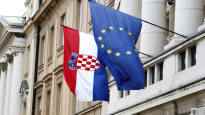Croatia will become the twentieth euro member of the EU. Seven more member countries rely on their own currency.
Swedish and Danish krone, Czech koruna, Polish zloty, Hungarian forint, Romanian Leu and Bulgarian leva.
It contains the last national monetary units of the EU from 1 January 2023. Croatia will adopt the euro on the same day, so once again one is missing from the crowd.
EU finance ministers sealed Croatia’s membership in the euro in Brussels on Tuesday.
The euro area last gained new countries in 2011–2015, when the Baltic countries adopted the euro one by one. Lithuania was the last to join the euro.
To become a new euro country in the midst of crises
Croatia joins the euro area at a difficult time.
The war started by Russia has plunged Europe into an energy crisis, the acceleration of inflation and the fear of recession. On Tuesday, the euro weakened to an equal exchange rate with the dollar.
Croatia is not scared by the turbulence, at least to the extent that it would postpone its accession. Croatia believes that the euro will benefit it, even though the introduction of the single currency will end its power to make an independent monetary policy.
– There are tough challenges ahead, but with joint actions we will do better, said the Croatian Finance Minister Zdravko Marić.
– The euro helps to invest in Croatia. It lowers the threshold for companies and eliminates the costs due to currency exchange, continued the Vice-President of the EU Commission Valdis Dombrovskis.
Croatia has been working for several years to become eligible for the Euro.
The EU Commission and the European Central Bank ECB appeared (you switch to another service) green light for the country in June. According to them, Croatia’s public finances, inflation and the currency exchange rate are stable enough to meet the criteria for membership.
Croatia’s accession, on the other hand, does not pose any particular risks to the stability of the euro. The country of four million inhabitants is one of the lowest-income countries in the EU, and its national economy is large.
In Croatia, it is closely monitored whether prices rise
At the same time, the finance ministers approved the official exchange rate of the euro and the kuna. The exchange rate was defined as 7.53 kuna per one euro.
In Croatia, as in all countries that have joined the euro, there have been fears of price increases after joining.
In the Baltics, Cyprus, Malta, Slovenia and Slovakia, prices rose by 0.2–0.4 percent during the first year of the euro, mainly because shops and service providers rounded prices up slightly when changing the currency.
Croatian Finance Minister Marić promises that prices will be monitored at the turn of the year.
– Rounding up always slightly increases inflation. It is our duty to prevent it, he says.
EU legislation protects against arbitrary price increases. Citizens can report price increases that they feel are unfair. If there is no clear reason for the withdrawal, the state can fine the company.
You can discuss the topic below until 11 p.m.
